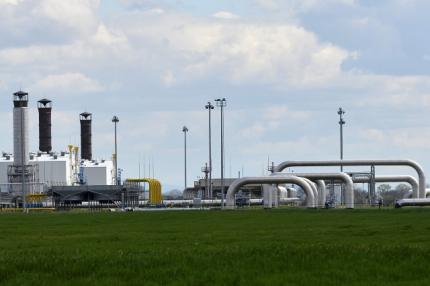Baltics can keep lights on if Russia turns off the gas
Baltics get all their gas from Russia

Baltics get all their gas from Russia
Bareksa.com - Estonia, Lithuania and Latvia depend on Russia for all their gas imports, but they each have defences in place to ensure sufficient energy supplies if Moscow cuts off gas exports in an escalation of the Ukraine crisis.
Russia's Gazprom has threatened to cut supplies to Ukraine in June if it receives no payment toward the billions of euros it owes. Gazprom supplies about 30 percent of Europe's gas and ships about half of that via Ukraine.
For the Baltics, however, the long-feared risk that Russia could use energy as a political weapon has encouraged them to come up with alternatives.
Promo Terbaru di Bareksa
These countries, therefore, have been some of the most vocal critics of what they see as Russian expansionism, pressing the European Union to adopt tougher sanctions in the crisis.
Estonia, out of all EU members, was the second least dependent on energy imports after Denmark in 2012, data from Estonia's statistics office showed.
Its main fuel for power generation in 2012 was shale oil at 81 percent, while renewables contributed another 15.2 percent.
Latvia's underground storage can hold as much as 2.3 billion cubic metres of gas for withdrawal, far exceeding its consumption of 1.5 bcm in 2013. After a mild winter, it still holds some reserves and will soon start injecting gas again.
In an extreme case, it can also withdraw the gas stored to keep the pressure in the reservoir, known as buffer gas, of which there is enough to meet its demand for a year.
"There are no indications at the moment that Russia is planning to cut natural gas supply for Latvia," Prime Minister Laimdota Straujuma told Reuters.
Lithuania expects to start importing liquefied natural gas (LNG) in 2015 by sea via a floating terminal called "Independence".
"If Russia considers cutting gas supplies to Lithuania, it will really need to hurry," said Gitanas Nauseda, chief economist at Lithuanian bank SEB. "Because any such cut will be meaningless by this December, when the LNG import terminal will be operational in Klaipeda."
Furthermore, the Kaliningrad exclave, home to Moscow's Baltic sea fleet, depends on gas supplies that pass through Lithuania. Last year the news surfaced, however, that Russia is building gas storage in Kaliningrad to meet its needs for two to four weeks.
"That indicates that Russia is preparing for something," said Arvydas Sekmokas, Lithuania's former energy minister. "But we are very close to crossing a line, when our energy dependence on Russia will be reduced significantly."
EXISTENTIAL THREAT
Lithuanian President Dalia Grybauskaite has said the ability to import LNG would put an end to the "existential threat" of dependence on Russian energy.
The planned floating import terminal could meet about two-thirds of its 2013 consumption of 2.7 bcm, and its capacity could later be increased to 4 bcm a year.
Analysts say Gazprom is helping Lithuania attract potential LNG suppliers by charging the highest price in Europe at $460-$490 per 1,000 cubic meters last year, compared with the EU average of $370-$380.
"High Russian pipeline gas prices are helping to attract LNG sellers, because in case of low prices, LNG would be uncompetitive," said Reinis Aboltins, an analyst at Riga-based think-tank Providus.
Latvia, whose gas prices are lower than Lithuania's, has been less willing to challenge Gazprom's monopoly, delaying gas market liberalization until April 2017.
"Latvia's lawmakers were scared that Russia could increase gas prices and that voters would punish the ruling coalition by voting for a pro-Russian Harmony Center party," said Juris Ozolins, former energy minister and former adviser to the European Commission.
Russia may be reluctant to cut supplies to the Baltics in part because such a move could push them further towards energy independence.
For Estonia, the smallest Baltic state, gas accounted for only about 10 percent of its energy supply, or 0.7 bcm, in 2012. No data was available for 2013.
"Estonia is largely self-sufficient in energy terms and is able to meet its electricity and heat needs from domestic sources," the International Energy Agency said in a report last September.
Katja Yafimava, a London-based analyst from the Oxford Institute for Energy Studies, said the Baltic states should not fear gas cuts as long as they pay the bills on time.
"The likelihood of Gazprom cutting gas to the Baltics, as well as to any other country - provided that the gas is being paid for in line with the contracts - is next to zero," she added.
Aboltins in Riga disagreed. "If the EU imposes hard economic sanctions on Russia, there is a high probability that Moscow will strike back." (Source : Reuters)
Pilihan Investasi di Bareksa
Klik produk untuk lihat lebih detail.
| Produk Eksklusif | Harga/Unit | 1 Bulan | 6 Bulan | YTD | 1 Tahun | 3 Tahun | 5 Tahun |
|---|---|---|---|---|---|---|---|
Trimegah Dana Tetap Syariah Kelas A | 1.384,88 | ||||||
Trimegah Dana Obligasi Nusantara | 1.095,38 | - | |||||
STAR Stable Amanah Sukuk autodebet | 1.084,98 | - | - | ||||
Capital Fixed Income Fund autodebet | 1.853,59 | ||||||
Insight Renewable Energy Fund | 2.287,69 |

Produk Belum Tersedia
Ayo daftar Bareksa SBN sekarang untuk bertransaksi ketika periode pembelian dibuka.

Produk Belum Tersedia
Ayo daftar Bareksa SBN sekarang untuk bertransaksi ketika periode pembelian dibuka.